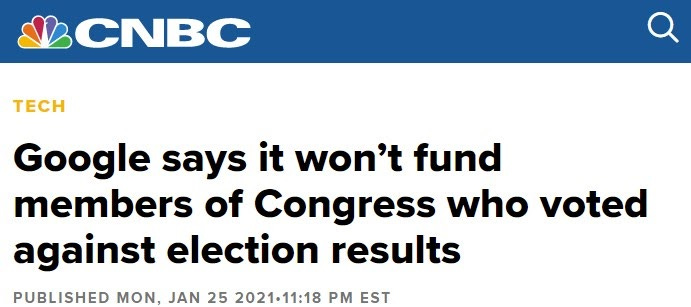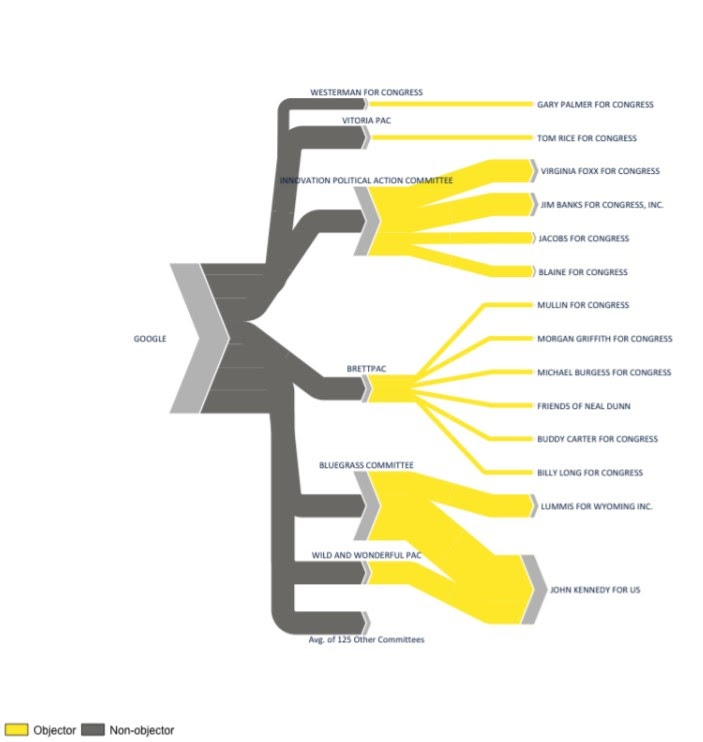Despite pledge, Google's campaign cash flows to Republican objectors
On January 25, Google announced that "after the disturbing events at the Capitol," its corporate PAC "will not be making any contributions this cycle to any member of Congress who voted against certification of the election results."
Nevertheless, since that announcement, corporate PAC money from Google has flowed to at least 14 Republican members of Congress who voted to overturn the election.
Here is how it works. On March 11, 2021, Google's PAC reported making a $5,000 contribution to the Wild and Wonderful PAC, the leadership PAC of Senator Shelley Moore Capito (R-WV). Then, on March 23, the Wild and Wonderful PAC, reported distributing $5,000 to the campaign committee of Senator John Kennedy (R-LA), who voted to overturn the election on January 6.
The Federal Election Commission allows these kinds of committee-to-committee transfers. This means that Google's PAC can donate to one political committee, and that committee can take the money, and donate it to another committee. The process obscures the ultimate recipient of Google's PAC cash.
Numerous political committees that received cash from Google this year distributed funds to Republican objectors. On March 5, 2021, Google's PAC reported making a $5,000 donation to the Bluegrass Committee, the leadership PAC of Senate Minority Leader Mitch McConnell (R-KY). On May 24, the Bluegrass Committee reported distributing $5,000 to the campaign committee of Senator Cynthia Lummis (R-WY), who voted to overturn the election on January 6.
Google's PAC is obviously not the sole source of funding for the Wild and Wonderful PAC or the Bluegrass Committee. The co-mingling of Google's PAC cash with other funds muddies the connection between Google, Kennedy, and Lummis. But the impact is the same. Google's PAC money is supporting members of Congress who voted not to certify the results of the 2020 election.
Overall, data collected by Advance Democracy, Inc. and provided to Popular Information, shows that, in 2021, Google has donated to six political committees that have also distributed funds to 14 Republican members of Congress that voted to overturn the election.
“We’ve long contributed on a bipartisan basis to candidates and committees that advocate for policies that help consumers and our employees,” a Google spokesperson told Popular Information in response to a request for comment. “We continue to stand by our commitment not to donate this cycle to any individual member of Congress who voted against certifying the 2020 election results.”
Dow Chemical's tangled web
On January 11, Dow gave one of the strongest and most specific statements cutting off donations to the 147 members of Congress who voted to overturn the election.
Dow is immediately suspending all corporate and employee political action committee (PAC) contributions to any member of Congress who voted to object to the certification of the presidential election. This suspension will remain in place for a period of one election cycle (two years for House members; up to six years for Senators), which specifically includes contributions to the candidate’s reelection committee and their affiliated PACs. Dow is committed to the principles of democracy and the peaceful transfer of power. Our values – integrity, respect for people, and protecting our planet – are the foundation on which we stand and our values guide our political contributions.
But, through a series of committee-to-committee transfers, money from Dow's PAC (DOWPAC) is flowing to Republican objectors. DOWPAC has donated $5,000 this year to the American Chemical Council PAC. The American Chemical Council PAC, earlier this year, donated $5,000 to the Republican Mainstreet Partnership PAC. And the Republican Mainstreet Partnership PAC donated several Republican objectors, including Congressman Cliff Bentz (R-OR) and Congressman Mike Bost (R-IL).
The donations were not sequential but all occurred in 2021. The order does not change the fact that DOWPAC's money is indirectly supporting Republicans who voted to overturn the election.
DOWPAC also donated $5,000 to the National Republican Campaign Committee (NRCC) on March 23, 2021. The NRCC is supporting the reelection of more than 130 Republican members of Congress who voted to overturn the election.
AT&T tries to have it both ways
On January 11, AT&T issued a statement announcing that its PAC would stop contributing to members of Congress that objected to the Electoral College:
Employees on our Federal PAC Board convened a call today and decided to suspend contributions to members of Congress who voted to object to the certification of Electoral College votes this week.
On February 22, AT&T's PAC donated $5,000 to the House Conservatives Fund. The House Conservatives Fund, the fundraising arm of the Republican Study Committee, is chaired by Congressman Jim Banks (R-IN) who voted to overturn the election.
In 2021, the House Conservatives Fund has already transferred money to numerous House Republican objectors, including Doug Lamborn (R-CO), Jim Hagedorn (R-MN), Brian Babin (R-TX), Ben Cline (R-VA), Nicole Malliotakis (R-NY), and Jim Baird (R-IN).
In March, Popular Information asked AT&T how its donation to the House Conservatives Fund was consistent with its January pledge to stop supporting Republican objectors. A company spokesperson provided the following response:
Our employee PACs continue to adhere to their policy adopted on January 11 of suspending contributions to the re-election campaigns of members of Congress who voted to object to the certification of Electoral College votes. The House Conservative Fund has assured us that none of the employee PAC’s contribution will go toward the re-election of any of those members of Congress.
But the overwhelming majority of members of the Republican Study Committee, which AT&T is supporting through its donation to the House Conservatives Fund, voted to overturn the election. The assurance that the House Conservatives Fund gave to AT&T will have little to no practical effect on its activities.
AT&T has also donated this year to several other political committees that have distributed funds to Republican objectors, including the Republican Main Street Partnership PAC and Tuesday Group PAC.
Other companies indirectly funding Republican objectors
Several other companies pledged to cut off funds to Republican objectors but continued to support them indirectly.
After January 6, Comcast said it would "suspend all of our political contributions to those elected officials who voted against certification of the electoral college votes." The company has since given to several political committees that are supporting Republican objectors, including Nebraska Sandhills PAC, the Bluegrass Committee, and Making A Responsible Stand For Households In America PAC.
Universal Music Group pledged to stop donating to Republicans who voted to overturn the election. It has since donated to two committees supporting Republican objectors, Making A Responsible Stand For Households In America PAC and Value In Electing Women PAC.
Walgreens said it "decided to suspend contributions to the members of Congress who voted to object to the certification of the U.S. Electoral College votes" and then donated to two committees that have supported those members: Republican Mainstreet Partnership PAC and the Tuesday Group PAC.
Popular Information previously reported numerous companies who pledged to suspend contributions to any member of Congress that voted to overturn the election and then donated to the NRCC and/or the National Republican Senatorial Committee (NRSC). This group includes Walmart, GE, Intel, Pfizer, Sanofi, Oracle, and Cigna. The NRCC and NRSC are umbrella fundraising groups backing every Republican objector that is running for reelection.





Google makes a mockery of their own words. How can we trust big tech? Who can we trust has become the question of our times. Tick, tock the clock marking down to 2022 elections. The Courts are loaded for GOP based rulings, the state legislatures have loaded anti voting laws in place and the corporations keep funding the madness. Local races are being entered by the far right to attempt to control that arena. The Dems don't know how to step up or won't.
We are in trouble.
We are seeing a system wide vise on Democracy.
In light of the Supreme Court's decision in Americans For Prosperity v. Bonta (https://www.scotusblog.com/2021/07/divided-court-invalidates-california-donor-disclosure-rules/), I'm waiting for the judicial end-around that bans reporting of campaign contributions.